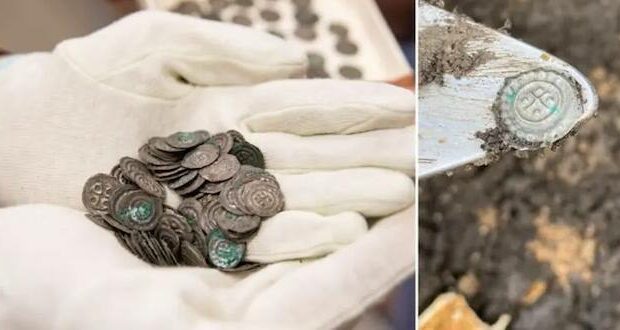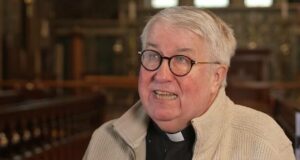A 12th century grave recently excavated by Swedish archaeologists provides new clues about Christian burial customs.
Several coins were found in the grave of a man whom experts believed was between 20 and 25 years old when he died and was buried in an ancient church in Visingsö, a Swedish island. The pieces of metal were produced between 1150 and 1180.
Archaeologists can easily distinguish Christian from pagan graves. Upon becoming Christian, the individual chose burial instead of pagan Viking cremation. Christians were then buried flat on their backs in an west-east. All other Vikings were cremated, says Johan Runer, a project manager with Uppdrag arkeologi, a cultural resource management company. His team led an excavation of twins and six other Christian converts in 2021.
READ: Sweden skipped lockdown and had lowest mortality rate
“The Christian character of the now-excavated graves is obvious because of how the tombs were laid out,” he explained.
“My colleague Kristina Jansson and I found two skeletons in the shaft where the wires were to be laid,” project manager Anna Ödéen said, according to Fox News. “We cleaned out the bones from the buried to get an idea of what the graves looked like. All of a sudden, three silver coins appeared. We soon realized that many more were lying close to the buried person’s left foot.”
One hundred and seventy silver bracteates were found in total. A bracteate is a piece of thin, coin-shaped metal that was used as jewelry. Although the find might be seen as just old metal to some, Swedish historians say that the discovery is significant to their field. What stumped archaeologists is that the coins were found in a Christian grave. It was not a common practice for early medieval Christians to be buried with a hoard of coins.
“The find is very special, partly because there are few similar finds from the time period, partly because some of the coins are completely unknown from before,” a Swedish museum official said. . “It is rare that finds are made in Christian graves; that custom belongs to prehistoric times, and that makes the Visingsö find special. Why this man in his 20s brought all these coins to the grave is not yet known. The county museum’s archaeologists hope for more clues when they work further with the find.”
A Swedish coin expert told the museum that the discovery is remarkable. “It is a completely sensational find that will change the early medieval coin history in Götaland and shed light on a period that is largely completely unknown,” the Royal Coin Cabinet’s Eeva Jonsson said.
In late Roman times, Christians were noted by official historians for the respect they treated their dead. Christian burial compared sharply to how Romans treated their dead. For most across the Roman empire and later periods, unless you were wealthy your body might be dumped in pits or rivers, or left to rot in the open.
–Dwight Widaman | Metro Voice
 Metro Voice News Celebrating Faith, Family & Community
Metro Voice News Celebrating Faith, Family & Community 








